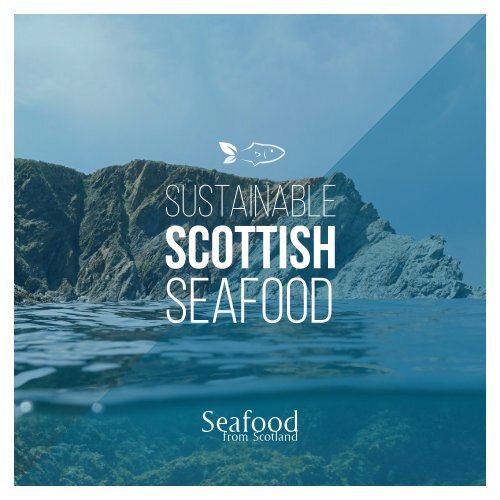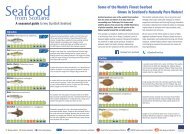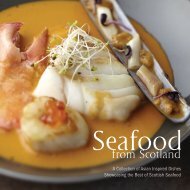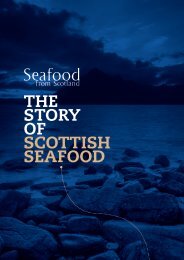Sustainable Scottish Seafood
Create successful ePaper yourself
Turn your PDF publications into a flip-book with our unique Google optimized e-Paper software.
<strong>Sustainable</strong><br />
SCOTTISH<br />
SEAFOOD
SUSTAINABLE<br />
SCOTTISH SEAFOOD<br />
In Scotland’s clean waters you will find some of<br />
the world’s finest seafood. It provides a valuable,<br />
high-quality resource that has been harvested<br />
by <strong>Scottish</strong> fishermen for generations.<br />
Our fishermen consider themselves to be custodians of the sea. They are<br />
passionate about sustaining the rich marine environment from which they make<br />
their living. <strong>Scottish</strong> fishermen have been very active in gaining independent<br />
authentication of the environmental and sustainable credentials available to<br />
the industry. They have been quick to engage in internationally recognised<br />
programmes to add value and recognition to their seafood offering.<br />
This commitment to sustainability practices has served to enhance Scotland’s<br />
reputation as a leader in responsible fishing methods committed to supplying<br />
sustainable products. Working closely with Government, scientists and<br />
environmental NGOs, our industry has taken a proactive approach to<br />
sustainability. From engaging in pioneering fishing and sustainable certification<br />
programmes, to becoming one of the acknowledged leaders in<br />
European sustainable fisheries management.<br />
In 2018...<br />
...the <strong>Scottish</strong> fleet landed<br />
446K<br />
TONNES<br />
603<br />
aquaculture sites<br />
98 %<br />
of Scotland’s coastal<br />
water has a high<br />
quality status<br />
...there were<br />
2,089<br />
active <strong>Scottish</strong> registered<br />
FISHING VESSELS<br />
&<br />
/8%<br />
of the EU total<br />
696K<br />
TONNES<br />
across<br />
the UK<br />
+£700 m<br />
was spent (wholesale value)<br />
on MSC labelled product<br />
in the supply chain, a 30%<br />
increase on last year.<br />
4,860<br />
FISHERMEN<br />
Within the UK,<br />
77% of all landings are from<br />
MSC certified fisheries,<br />
equating to over 540,000<br />
tonnes of sustainably<br />
sourced fish and seafood 1<br />
2,178<br />
FARMERS IN<br />
AQUACULTURE<br />
...a consumer insight study 2 by Globescan found...<br />
...83 %<br />
of UK seafood consumers agree<br />
that we need to protect seafood<br />
supplies for future generations.<br />
...81<br />
% of UK seafood<br />
consumers agree<br />
that in order to save the ocean,<br />
we have to consume seafood<br />
only from sustainable sources<br />
Recognising the need to act, a growing community of restaurants, hotels, retailers,<br />
traders, brands, universities and caterers are making demonstrable commitments to<br />
improving the sustainability of seafood supply chains.<br />
1<br />
MSC data against FAO, accurate as of 3rd October 2018<br />
2<br />
In 2018, the MSC partnered with GlobeScan to conduct a global research study into consumer perceptions on seafood, sustainability and the MSC’s role in the industry.<br />
1,315 UK consumers (1,020 UK seafood consumers) took part in the UK.<br />
02 03
Marine Stewardship Council<br />
The Marine Stewardship Council is an international non-profit organisation. They recognise and<br />
reward efforts to protect oceans and safeguard seafood supplies for the future.<br />
DIFFERENT<br />
ACCREDITATIONS<br />
Environmental and <strong>Sustainable</strong> Certification<br />
A large percentage of <strong>Scottish</strong> fishermen have now gained accreditation.<br />
<strong>Scottish</strong> fishermen have committed themselves to lead in industry<br />
environmental and sustainable standards by gaining accreditations<br />
and going above and beyond the minimum requirement.<br />
This has helped to enhance Scotland’s reputation as a leader in<br />
responsible fishing methods and demonstrates a commitment to<br />
supplying sustainable products.<br />
All <strong>Scottish</strong> fisheries are controlled, regulated and managed in order to deliver a<br />
sustainable and traceable supply of seafood from net to plate. 3<br />
Recently, many species found in the North East Atlantic have shown a significant<br />
increase in abundance. For example, the European hake and North Sea plaice<br />
stocks are both at historic highs. Another example is that aggregate whitefish<br />
spawning stock biomass has increased dramatically over the last two decades<br />
and is now also at a record high. Over the same period, the average level of<br />
fishing mortality of whitefish stocks has fallen to record-low levels. 4<br />
3<br />
With the exception of squid, scallops, crab and lobster fisheries.<br />
4<br />
The NAFC Marine Centre have collated and summarised published data by the International Council for the Exploration<br />
of the Sea (ICES) to provide an overview of the 2020 trends in <strong>Scottish</strong> Fish Stocks and their levels of exploitation.<br />
Fishery Improvement Projectsl<br />
Fishery Improvement Projects (FIPs) are multi-stakeholder initiatives that aim to help fisheries work<br />
towards sustainability. The program also helps fisheries prepare for entering full MSC assessment.<br />
Friend of the Sea<br />
Friend of the Sea has become the leading certification standard for products and services which<br />
respect and protect the marine environment.<br />
RSPCA Assured<br />
RSPCA Assured is RSPCA’s ethical food label dedicated to farm animal welfare. The RSPCA Assured<br />
label on eggs, fish, meat and milk confirm farms, and every stage of the animals’ lives, have been<br />
assessed to RSPCA animal welfare standards.<br />
Label Rouge<br />
A large number of regulatory measures restrict the type, design, construction or amount of fishing<br />
gear that <strong>Scottish</strong> fishermen can use. This helps to control fishing pressure and assists in targeting<br />
species more selectively. Granted by the French Ministry of Agriculture, Label Rouge is a prestigious<br />
quality mark given to foods of superior quality and taste.<br />
The Soil Association - Organic Standard<br />
The Soil Association, its standards and activities, and the practice of organic farmers are all based on<br />
a set of internationally recognised principles. Soil Association Certification Limited is the UK’s largest<br />
and oldest organic certification body.<br />
The Organic Food Federation<br />
The Organic Food Federation is at the forefront of promoting organic methods, maintaining high<br />
standards and best practice within the sector.<br />
Protected Geographic Indications<br />
The Protected Geographical Indications (PGI) identify an agricultural product, raw or processed, for<br />
which quality, reputation or other characteristics are linked to its geographical origin.<br />
04 05
MEASURES TAKEN BY SCOTLAND<br />
<strong>Scottish</strong> Focused Conservation Measures<br />
The Conservation Credits Scheme: This pioneering approach was developed by the<br />
<strong>Scottish</strong> Government and industry. In return for participating in additional conservation<br />
measures during their fishing activity, vessels were allowed additional days at sea over<br />
and above their basic entitlement. Elements of this now ended scheme are now used<br />
throughout Europe<br />
The additional conservation measures include:<br />
Avoiding areas where high concentrations of cod occur using larger mesh sizes to allow<br />
juvenile fish to escape and using specially designed gear that reduces the capture of cod,<br />
whilst still fishing effectively for other species.<br />
Area Closures: The use of area closures has also contributed to reductions in fishing<br />
mortality for cod and other demersal species. Several types of fishing closure are operated<br />
by Marine Scotland and observed by <strong>Scottish</strong> industry.<br />
Species Specific Measures: Numerous regulations, particularly for shellfish,<br />
have been implemented to provide further conservation measures that enhance<br />
the sustainability of these fisheries.<br />
These include a ban on landing egg-bearing female and newly moulted (soft) brown crabs,<br />
restrictions on landing crab claws, and local v-notching of egg-bearing female lobsters.<br />
Fishermen catching these are required to return them to the sea to help maintain healthy<br />
reproductive stocks. Specific limitations on mobile scallop gear exist in inshore waters,<br />
limiting the size and capacity of fishing pressure on inshore scallop grounds.<br />
06<br />
07
MODERN MANAGEMENT<br />
& REGULATION<br />
The Common Fisheries Policy (CFP) is Europe’s<br />
regulatory regime governing fisheries in EU waters.<br />
It controls how much fish each Member State is allowed to catch and the<br />
conditions under which it must be caught.<br />
This includes the type of net used, how long a vessel can fish for,<br />
and the size of fish that can be landed.<br />
Marine Scotland, within the <strong>Scottish</strong> Government is responsible for the<br />
management of the <strong>Scottish</strong> fishing industry and for ensuring that the fleet<br />
adheres to CFP rules and regulations.<br />
All <strong>Scottish</strong> fishing vessels are licensed, based on their size, where they fish and<br />
what they catch. This helps maintain the size and catching capabilities of the fleet.<br />
6. Local & regional Conservation:<br />
To maintain the environment, local<br />
conservation measures limit or prevent<br />
types of fishing activity. Scotland has a<br />
network of Marine Protected Areas (MPAs)<br />
which conserve and protect species,<br />
habitats and marine features of the seas.<br />
5. Gear Restrictions: Many<br />
regulatory measures restrict<br />
the type, design, construction<br />
or amount of fishing gear<br />
that <strong>Scottish</strong> fishermen can<br />
use. This helps to control<br />
fishing pressure and assists<br />
in targeting species more<br />
selectively.<br />
1. Licensing: All <strong>Scottish</strong> fishing<br />
vessels are licensed based on<br />
their size, where they fish, and<br />
what they catch. This helps<br />
maintain the size and catching<br />
capacity of the fleet.<br />
2. Catch Limits: Nearly all<br />
<strong>Scottish</strong> catches are limited by<br />
a Total Allowable Catch (TAC<br />
or Quota). Based on scientific<br />
advice, TACs are apportioned<br />
by the EU and neighbouring<br />
states and decided annually<br />
by the European Council.<br />
4. Minimum Landing Sizes:<br />
Almost all <strong>Scottish</strong> commercial<br />
stocks have minimum sizes for<br />
landing and selling.<br />
3. Effort Limitation or ‘Days at<br />
Sea’: An additional way to<br />
control fishing pressure is to set<br />
the amount of time vessels are<br />
allowed to spend at sea. This is<br />
managed by Marine Scotland.<br />
08 09
INDEPENDENT SCHEMES IN SCOTLAND<br />
Fishing for Litter<br />
Launched in Scotland in 2005, Fishing for Litter<br />
encourages vessels to safely land any litter they<br />
‘fish’. So far, more than 1,400 tonnes of marine litter<br />
from Scotland’s seas has been disposed of safely<br />
in the 19 participating ports.<br />
The scheme provides an environmental response<br />
to the issue of marine litter in the seas, with<br />
more than 230 boats participating in the <strong>Scottish</strong><br />
scheme.<br />
<strong>Scottish</strong> Pelagic Sustainability Group<br />
Established in 2006, the SPSG represents all<br />
sectors of Scotland’s pelagic industry, including<br />
catching, processing and marketing.<br />
The over-riding aim of SPSG is to ensure that the<br />
<strong>Scottish</strong> pelagic industry is truly sustainable.<br />
SPSG was established to oversee the certification<br />
of its main fisheries to the Marine Stewardship<br />
Council eco-label standard and is currently driving<br />
forward a number of other sustainability initiatives.<br />
SPSG is also involved in a range of scientific<br />
initiatives to enhance our understanding of pelagic<br />
stocks and to ensure informed decisions are made<br />
with their management.<br />
10<br />
The Seafish Responsible<br />
Fishing Scheme<br />
This independently-audited UK-wide certification<br />
scheme recognises<br />
best practice operation by<br />
vessels and crew.<br />
The scheme was originally piloted with <strong>Scottish</strong><br />
boats, and there is now wide participation<br />
across all sectors, with approximately 90 vessels<br />
registered<br />
in the scheme in Scotland.<br />
<strong>Scottish</strong> Fisheries <strong>Sustainable</strong><br />
Accreditation Group<br />
Set up in 2008, the SFSAG was formed to provide<br />
a collective body to represent stakeholders with<br />
catching and marketing interests in the seafood<br />
industry, specifically involved in demersal fishing<br />
in the north sea and west of Scotland.<br />
The focus of the group is to develop and<br />
achieve a programme of sustainable Marine<br />
Stewardship Council (MSC) certification which<br />
is intended to maximise the benefit for the<br />
supply chain and industry as a whole.<br />
11
VERIFICATION & COMPLIANCE<br />
<strong>Scottish</strong> seafood is fully accountable and traceable.<br />
All vessels greater than 12 metres now operate with<br />
compulsory vessel monitoring systems and<br />
electronic logbooks.<br />
Vessels record what, where and when catches were made, and this data links<br />
onwards to where and when it was landed and sold, and who purchased the<br />
catch. The information supports management of a sustainable system and<br />
provides traceability from point of capture into the supply chain.<br />
Further verification and control of fishing activity is undertaken by Marine<br />
Scotland, using surveillance programmes from land, sea and air.<br />
12<br />
13
Worldwide, buyers and consumers are increasingly<br />
seeking assurances that seafood conforms to<br />
higher standards of quality, safety, traceability, and<br />
sustainability. Scotland’s strength in regulations,<br />
voluntary schemes and accreditations guarantee a<br />
high standard achieved right across the industry<br />
that you can be proud of choosing.<br />
Consumers’ increasing awareness of sustainability and seafood quality pushes<br />
our industry to continually strive to improve. <strong>Scottish</strong> seafood remains at the<br />
forefront of this push as both advocates and practitioners of sustainable<br />
practices, not only through accreditation but in the overall mindset of<br />
our fisheries and individuals within the industry.<br />
<strong>Seafood</strong> from Scotland is working with all our member organisations to ensure<br />
<strong>Scottish</strong> seafood and its sustainability remains the best in the world.<br />
14<br />
15
companies WITH<br />
Accreditation
Company Name<br />
MSC<br />
Angelbond Ltd <br />
Friend<br />
of the<br />
Sea<br />
RSPCA<br />
Assured<br />
Label<br />
Rouge<br />
SALSA BRC ASC<br />
Soil<br />
Association<br />
Organic<br />
Kosher<br />
Aquascot <br />
Argyll Smokery <br />
Associated <strong>Seafood</strong>s <br />
Barratlantic Ltd <br />
Belhaven Smokehouse Ltd <br />
Blueshell Mussels Ltd <br />
Blydoit Fish Ltd <br />
Braehead ( SFO Enterprises) Ltd<br />
(Bellshill)<br />
Braehead (SFO Enterprises) Ltd<br />
(Fraserburgh)<br />
Caley <strong>Seafood</strong>s Ltd <br />
<br />
<br />
Campbells and Co <br />
Campbell's Prime Meat Ltd <br />
Campsie Glen Smoke House <br />
Castle MacLellan Foods Ltd <br />
Cluny Fish Supplies <br />
Colin Fraser <br />
Cooke Aquaculture Scotland <br />
Couper <strong>Seafood</strong>s <br />
Dawnfresh <strong>Seafood</strong>s Ltd <br />
Denholm <strong>Seafood</strong>s Ltd <br />
Downies of Whitehills <br />
G & J Jack <strong>Seafood</strong>s Ltd <br />
George Campbell & Sons <br />
George S Forman Ltd <br />
GMR <strong>Seafood</strong>s Ltd <br />
Gourmet's Choice Ltd <br />
Grieg <strong>Seafood</strong> Shetland Ltd <br />
GT <strong>Seafood</strong>s Ltd <br />
Others<br />
Company Name<br />
MSC<br />
Friend<br />
of the<br />
Sea<br />
RSPCA<br />
Assured<br />
Label<br />
Rouge<br />
Hebridean Smokehouse Ltd <br />
Highland Fish Ltd <br />
SALSA BRC ASC<br />
Highland Smoked Salmon (Scotland) <br />
International Fish Canners <br />
Soil<br />
Association<br />
Organic<br />
Inverawe Smokehouse <br />
Isle of Barra Oysters <br />
J Charles Ltd <br />
JK Thomson <br />
Kosher<br />
John Ross Jnr (Aberdeen Ltd) <br />
John Vallance <br />
Joseph Robertson Ltd <br />
Kallin Shellfish <br />
Laeso Fish Ltd <br />
Lion Speciality Foods Ltd <br />
Loch Duart <br />
Loch Fyne Oysters Ltd <br />
Loch Fyne Seafarms Ltd <br />
Lunar Filleting <br />
Lunar Freezing Aberdeen <br />
Macduff Shellfish (Scotland) Ltd <br />
MacMillan Foods<br />
(Kintyre Smokehouse Ltd)<br />
Macrae Edinburgh Ltd <br />
Mara Seaweed <br />
Others<br />
<br />
Marine Products (Scotland) Ltd <br />
Mowi Scotland <br />
Noble Brothers (Fraserburgh) <br />
Nolan <strong>Seafood</strong>s <br />
Nor Sea Foods Ltd <br />
Ocean Quality UK Ltd <br />
Orkney Fishermen's Society Ltd
Company Name<br />
MSC<br />
Pelagia Shetland Ltd <br />
Peterhead Port Authority <br />
Friend<br />
of the<br />
Sea<br />
RSPCA<br />
Assured<br />
Label<br />
Rouge<br />
Prime <strong>Seafood</strong>s <br />
QA Fish Ltd <br />
SALSA BRC ASC<br />
Soil<br />
Association<br />
Organic<br />
Raven Rock Sea Products Ltd <br />
RR Spink & sons (arbroath) Ltd <br />
RW Henderson Ltd <br />
Kosher<br />
Salmac Sales Ltd <br />
<strong>Scottish</strong> Sea Farms <br />
<strong>Scottish</strong> <strong>Seafood</strong> Association <br />
<strong>Scottish</strong> Seas LTD <br />
<strong>Scottish</strong> Shellfish Marketing Group <br />
Scrabster <strong>Seafood</strong>s Ltd <br />
<strong>Seafood</strong> Ecosse Ltd <br />
<strong>Seafood</strong> Sourcing Ltd <br />
Seaspray Shetland <br />
Shetland Catch Ltd <br />
Shetland Fish Ltd <br />
Shetland Mussels <br />
Simpson Fish Ltd <br />
Skateraw Fisheries Ltd <br />
Skipness Smokehouse Creelers <br />
St James Smokehouse (Scotland) Ltd <br />
<strong>Sustainable</strong> <strong>Seafood</strong>s Ltd <br />
The Ethical Shellfish Company <br />
The <strong>Scottish</strong> Salmon Company <br />
Thistle <strong>Seafood</strong> Ltd <br />
Ugie Salmon Fishing <br />
Wester Ross Salmon <br />
Westray Processors Ltd <br />
Whitelink <strong>Seafood</strong>s <br />
Others
MSC ACCREDITED<br />
FISHERIES<br />
The number of <strong>Scottish</strong> fisheries<br />
engaged in the MSC programme<br />
has grown considerably in recent<br />
years, offering consumers a wide<br />
range of species and sustainably<br />
sourced fish and seafood products:<br />
• <strong>Scottish</strong> Fisheries <strong>Sustainable</strong> Accreditation Group (SFSAG):<br />
- Rockall Haddock<br />
- Northern Demersal Stocks (Haddock, Hake, Plaice, Saithe)<br />
• <strong>Scottish</strong> Shellfish Management Organisation (SSMO):<br />
- Shetland inshore brown crab and scallop<br />
- Shetland and <strong>Scottish</strong> Mainland rope grown mussel<br />
• <strong>Scottish</strong> Pelagic Sustainability Group<br />
- Atlanto Scandian Herring<br />
- North Sea Herring<br />
- Blue Whiting<br />
Haddock<br />
Scotland’s favourite whitefish,<br />
caught in the North Sea and off the<br />
west coast of Scotland.<br />
A sweet flavoured fish with medium<br />
to large flakes, versatile for many<br />
cooking methods. Whole haddock<br />
are available up to 3.5kg, but most<br />
commonly as 2 whole side fillets up<br />
to 400g.<br />
Hake<br />
An excellent fish, very popular in<br />
Europe, fished in the North Sea and<br />
west of Scotland, hake has a soft<br />
flesh which firms up when cooked.<br />
Ranging from 1kg to 5kg, hake has a<br />
long, round slender body, great for<br />
cutting into steaks or loins.<br />
Plaice<br />
A versatile meaty flatfish with a<br />
sweet, mild flavour, this species is<br />
fished from the North Sea.<br />
Ranging from 230g to 2kg and most<br />
commonly available between 500g<br />
to 750g, these whole fish are easy<br />
to identify by their distinctive orange<br />
spots. Best cooked whole for a great<br />
flavour.
Saithe (Coley)<br />
A good alternative to cod and<br />
haddock. It is a fine flavoured<br />
species abundant in all waters<br />
around Scotland.<br />
Similar to cod, the species ranges<br />
from 500g to 6kg as whole fish.<br />
Scallop<br />
Caught around Scotland’s coast,<br />
using mobile gear or by hand<br />
diving. Scallop meat has a sweet<br />
delicate flavour and needs minimal<br />
cooking.<br />
<strong>Scottish</strong> King scallops have<br />
approximately 15cm wide shells,<br />
with 18-35 pieces of meat per kg<br />
(out of shell). Queen scallops have<br />
approximately 7cm wide shells and<br />
40 to 120 pieces of meat per kg.<br />
Herring<br />
High in Omega 3, this sustainable<br />
oil-rich fish is great grilled or baked<br />
whole, and of course when smoked<br />
makes fantastic <strong>Scottish</strong> kippers.<br />
A smooth, slender body, silvery skin<br />
with hints of green and blue, they<br />
range in size from 100g to 450g.<br />
Brown crab<br />
Traditionally fished by pot and creel,<br />
particularly around the west coast<br />
and the <strong>Scottish</strong> Isles.<br />
Brown crab can be bought live,<br />
cooked, dressed or as ready-made<br />
products such as crab cakes or<br />
terrines. The rich white meat found<br />
in the claws is very sweet and the<br />
brown meat is particularly rich<br />
in Omega 3 and other beneficial<br />
vitamins and minerals. Male crabs<br />
range from 1kg to 2kg with an<br />
estimated yield of 35%.<br />
Mussel<br />
Rope grown on the west coast<br />
of Scotland and around the<br />
<strong>Scottish</strong> Isles, mussels are a highly<br />
sustainable species and are quick<br />
and easy to cook.<br />
<strong>Scottish</strong> mussels have a meaty flesh<br />
and medium sweet seafood flavour.<br />
Whiting<br />
A smaller fish from the cod family<br />
with a silver-grey body and round<br />
belly, this species is often sold<br />
around 2kg.<br />
Similar to many of the whitefish<br />
species, it takes very little cooking.<br />
Mainly caught in the northern<br />
North Sea.
<strong>Sustainable</strong><br />
SCOTTISH<br />
SEAFOOD






